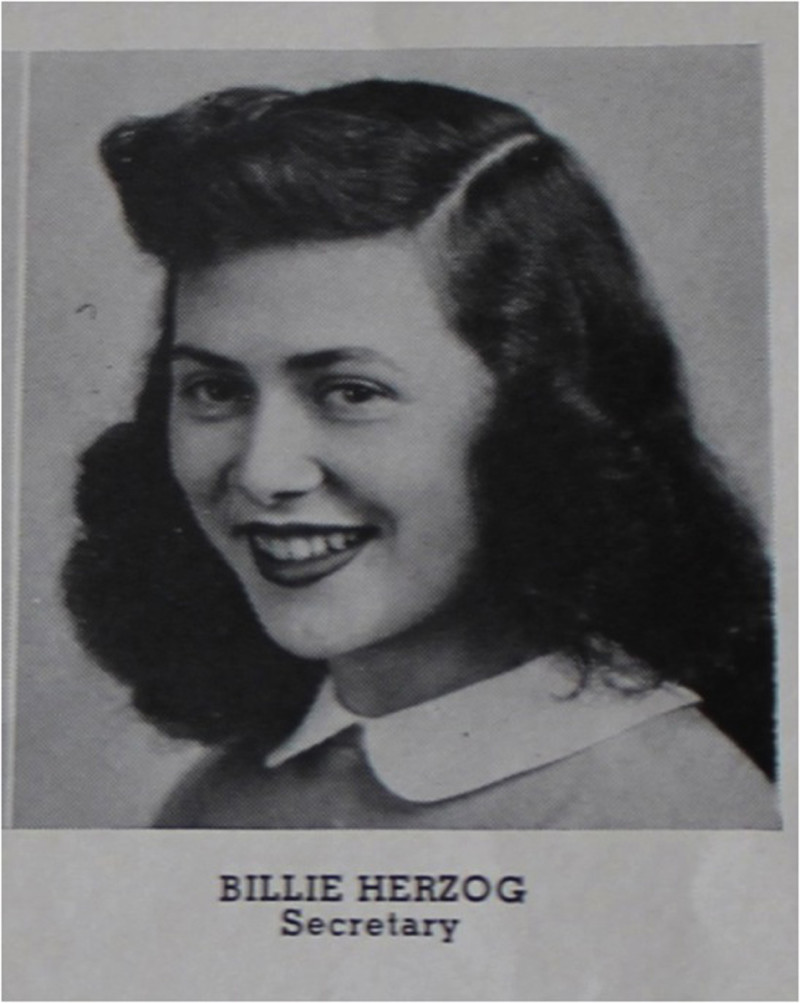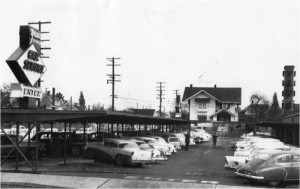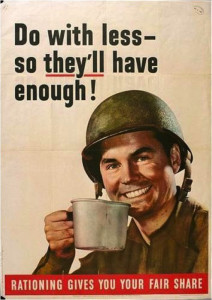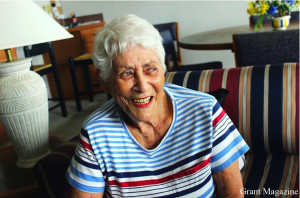
Former Grant High School student Billie Herzog slouches down in the leather seats of her friend’s shiny new Ford convertible. She’s dressed in a white collared shirt underneath a plain baggy sweater tucked into a knee-length plaid skirt. It’s her go-to outfit. Herzog and her friends giggle after spotting a group of nearby boys sporting varsity letter jackets and slick, combed-back hair. The girls tap their wooden pump heels along to Frank Sinatra’s soulful sound interrupted by soft static coming from the radio.
They are parked at Yaw’s Top Notch Restaurant just off of Sandy Blvd, Grant students’ favorite hangout. A young waitress roller-skates up to their car with steaming burgers and fries, 15 cents apiece. Billie hurriedly rolls down the window and graciously accepts the food. Herzog’s roller pin ringlet curls barely budge as she bites into her juicy cheeseburger.
It’s 1945. The U.S. has just dropped two atomic bombs in Japan, and World War II is finally coming to an end. Harry S. Truman takes over for Franklin D. Roosevelt as president. The minimum wage is 40 cents an hour. Adolf Hitler and his wife of one day just committed suicide. Swing bands dominate the music scene.
Billie Marx (formerly Herzog), 88, attended Grant High School from 1940 to 1945 and faced strikingly different experiences than Grant students do today. Apart from a handful of distinct landmarks, the Portland of 70 years ago is unrecognizable.
Marx recalls saying to a friend “see you downtown” and that was it. Without making any plans to meet at a location, you would actually see them downtown. Although Portland’s shipbuilding industry thrived, Portlanders were not immune to the economic strife felt throughout the country. Marx says food was rationed, materials were scarce and it was difficult to avoid feeling grief for all the fallen soldiers in the war, whether it was someone you were close to or not.
After finishing up her elementary and middle school career at Alameda with close classmates, Marx was eager to start high school at Grant. During December of her freshman year the bombing on Pearl Harbor took place, marking the beginning of America’s painful involvement in the war.
She remembers the whole school being devastated when it happened. She remembers that you could see the emotional impact physically weighing people down. The halls were not full of loud bustling people, goofing around on their way to class as usual, but instead packed with stern faces and somber whispers.
Many of the students’ family members and teachers and even senior boys went into the service. Marx personally spent her high school years praying not to get that dreadful telegraph passing on the news of her brother’s death, and luckily it never came. Sadly, many of her peers did have to experience the trauma of seeing those grim-faced servicemen at their door. There was always someone in the midst of a great loss at Grant.
The one thing that really stuck with Marx throughout her years at Grant was a particular assembly. Grant assemblies were usually on a more light-hearted side, from talent shows to student body elections.
This one was the exception. The purpose of this assembly was to say goodbye to the two Japanese girls who went to Grant, after the U.S. declared everybody of Japanese descent must be rounded up and taken to “War Relocation Camps.” An audience full of teary-eyed students was at a loss for words. Marx asks, what is there to say in that situation? The faculty certainly didn’t know. People awkwardly stumbled on words while they spoke and tried to avoid direct talk about their internment. Marx remembers thinking, “They are as much as citizens as everyone here. They have done nothing wrong. How can the government just take away their basic rights like that?” She says the whole thing made her feel sick.
“They are as much as citizens as everyone here. They have done nothing wrong. How can the government just take away their basic rights like that?” -Billie Marx
It wasn’t just the news of the war affecting Grant students. Things in their everyday life changed because of it too. The presence of war was everywhere. Women took over many factory jobs when the men went to fight. Gasoline was scarce and students were forced to walk to school no matter the weather condition.
Fashion took a big blow as clothing materials were rationed. People were dressed simplistically and practicality was valued over looks, much different than today where fashion is considered a top priority.
The government asked the American people to donate scrap rubber, metal and paper. Less fresh meat and fruit was found in the average person’s diet. Prices went up. “Victory Gardens” were encouraged to avoid the limits of rationing and save food for soldiers. Most of women’s shoes were made of wood. People relied heavily on radios for news of the war and entertaining programs that provided momentarily relief. Daylight savings time was observed all year round to conserve electricity. This forced Marx and friends to nervously trek to school when it was pitch black out. Beach trips that used to be an exciting getaway for the young Marx turned frightening after spotting dozen of guards patrolling the shores, holding back their snarling Dobermans.
Of course war put a damper on things, but Marx refused to let it ruin her high school years. She took drama class with a teacher who resembled a “pigeon” and directed at Civic Theater. Marx and her classmates would nervously scramble as she barked orders. After getting over her initial nervousness of performing in front of her friends, Marx participated in a few school play productions. She also took on the role of school secretary. Marx enjoyed reading the monthly newspaper young journalists in the school put out, titled the Grantonian.
Since she described herself as an average student, she had plenty of time away from studying and reading textbooks to go roller-skating and on movie dates (costing only two quarters) and attend school dances.
The dances were one of the biggest highlights for Marx. There were casual after school dances once in the month in the gym and more formal dances where students dressed up and were on their best behavior. Girls would giggle anxiously among themselves and stand to the side hoping a charming young boy would invite them to dance.
Instead of the sweaty mosh pits and explicit dancing students see today, boys and girls would pair off and politely show their ballroom moves. Marx says you were automatically cool if you knew how to do the jitterbug well.
Huge crowds would gather at football games, ferociously yelling Grant’s cheers as they dominated Jefferson and our other rivals to win the state championship. Women’s sports were not available the way they are today, but Marx remembers laughing and having fun while playing pick-up tennis and baseball around the neighborhood with other girls.
Grant in the 40s lacked diversity and was primarily white due to Japanese internment and African American segregation in the USA. Title 9 didn’t pass until 1972 and females at the time didn’t have equal opportunities. Although World War II was a turning point for women in the workforce, they still were not allowed to do many of the things that men could when it came to employment, sports or social events.
After attending Reed College and the University of Oregon, Marx married at age 22. She then settled down in Northern Washington, where she spent the majority of her life.
Today Marx lives in a retirement home at Holladay Park Plaza in the Lloyd district of Portland. Mention her name to anyone there and they’ll instantly crack a smile and tell you how wonderful she is.
From the popular hangout spots, to the type of dances, to the courses offered, Grant has changed a lot. The biggest difference is today Grant students don’t have to face war directly or rationing and other painful circumstances that accompanied World War II.
Advances in communication also plays a big role in Grant students’ lives. Marx remembers it was difficult for friend to get ahold of each other. Growing up, she would often have to make plans in person, coordinate with relatives through letter-writing and use a rotary phone to call friends’ homes. Today, kids can call and text friends with a click of a button. Most students are tied to social media, and no longer place as much value on face to face communication. Marx says that when radios first came out, they were considered advanced technology and regarded highly by all.
Soon Grant will no longer hold the same memories and rooms students remember. With the coming remodel in 2017, a new school will be erected in its place. But that will not destroy Grant General’s pride.
The original Yaw’s Top Notch burgers shut down in 1982 and was replaced by McDonald’s. You can no longer meet up in downtown Portland without specifying which street. With the chaos of buses, max lines, and streetcars, it isn’t a popular hangout spot.
Push open the doors of Grant today and you will see girls carrying around rugby balls, wearing soccer jerseys and fighting for equal pay. Females have a voice like never before. Look around and you’ll notice a group of white, Asian, black and Latino students laughing and chatting together.
Today Grant has an active Black Student Union and a gay-straight alliance club. Marx says these things would never have been considered socially acceptable when she attended Grant. Education has branched off from only textbook reading and worksheets and has migrated in the direction of a more hands-on, creative approach.
No matter who you are or what you believe in, things are changing for Grant and its community. The class of 1945 could never have imagined Grant today, and there is no way to predict how it will be in another 70 years. Who knows, you may even find robots roaming the halls or students using 3D printers to create human organs in the classroom. Even if Grant isn’t recognizable to us in the future, it will always hold on to the General spirit and sense of community all the generations of students have shared.






